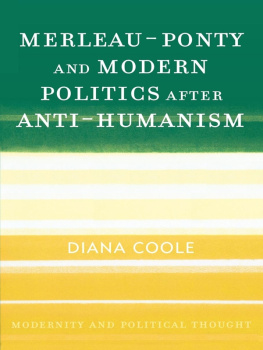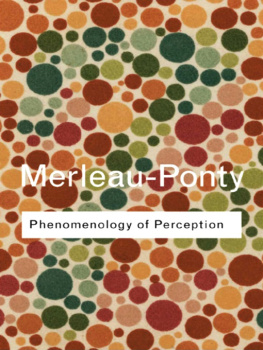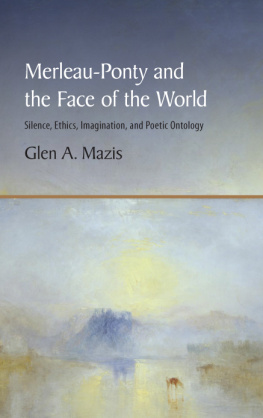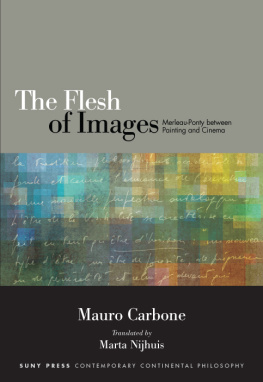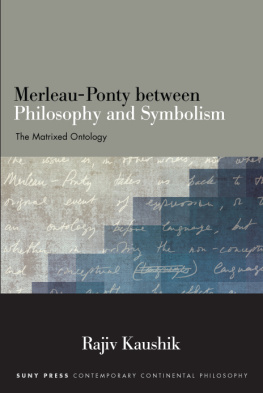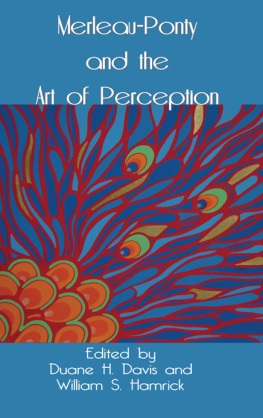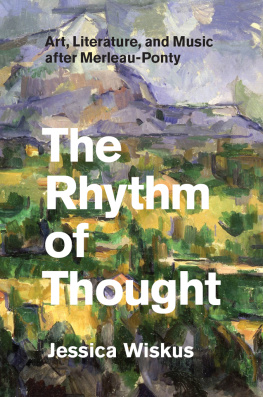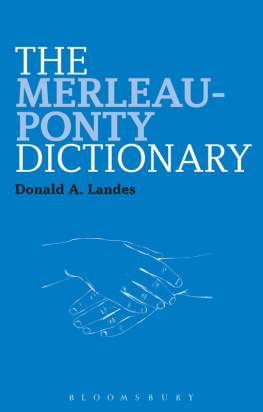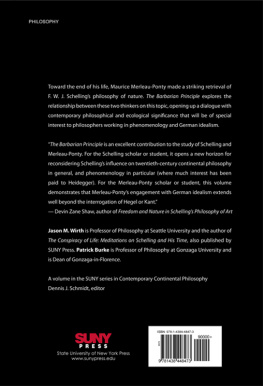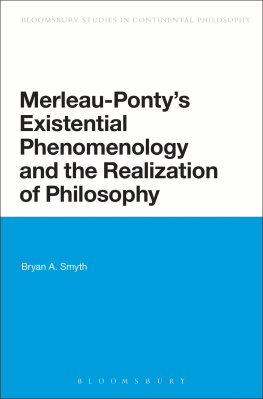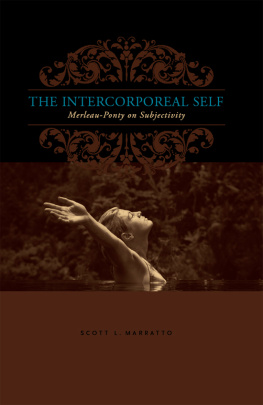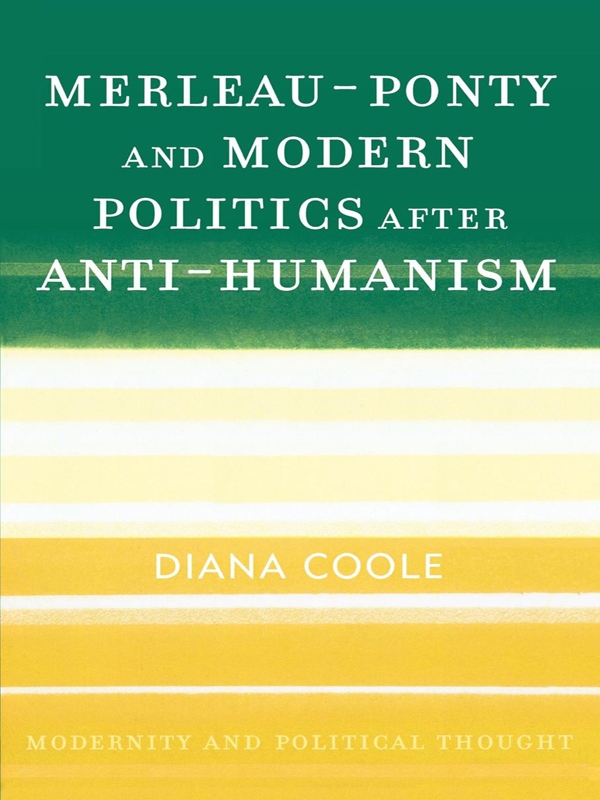Merleau-Ponty, M. Phenomenology of Perception. London: Routledge, 1962.
. In Praise of Philosophy. Evanston, Ill.: Northwestern University Press, 1963.
. The Primacy of Perception, edited by J. M. Edie. Evanston, Ill.: Northwestern University Press, 1964.
. Sense and Non-Sense. Evanston, Ill.: Northwestern University Press, 1964.
. Signs. Evanston, Ill.: Northwestern University Press, 1964.
. The Structure of Behaviour. London: Methuen, 1965.
. The Visible and the Invisible. Evanston, Ill.: Northwestern University Press, 1968.
. Humanism and Terror. Boston, Mass.: Beacon Press, 1969.
. Themes from the Lectures. Evanston, Ill.: Northwestern University Press, 1970.
. Consciousness and the Acquisition of Language. Evanston, Ill.: Northwestern University Press, 1973.
. The Prose of the World. Evanston, Ill.: Northwestern University Press, 1973.
. Adventures of the Dialectic. London: Heinemann, 1974.
. Philosophy and Non-Philosophy Since Hegel. Telos 29 (Fall 1976).
. Texts and Dialogues: On Philosophy, Politics, and Culture, edited by H. Silverman and J. R. Barry. New York: Humanity Books, 1992.
. Maurice Merleau-Ponty, Nature: Course Notes from the Collge de France. Compiled with notes by D. Sglard. Evanston, Ill.: Northwestern University Press, 2003.
Major Works about Merleau-Pontys Politics and Its Underlying Philosophy
Archard, D. Marxism and Existentialism: The Political Philosophy of Sartre and Merleau-Ponty. Ulster: Blackstaff Press, 1980.
Busch, T., and S. Gallagher, eds. Merleau-Ponty, Hermeneutics, and Postmodernism. Albany, N.Y.: SUNY Press, 1992.
Carbone, M. The Thinking of the Sensible: Merleau-Pontys A-Philosophy . Evanston, Ill.: Northwestern University Press, 2004.
Carmen, T., and M. Hansen, eds. The Cambridge Companion to Merleau-Ponty. Cambridge: Cambridge University Press, 2005.
Crossley, N. The Politics of Subjectivity. Between Foucault and Merleau-Ponty. Aldershot: Avebury, 1994.
Dauenhauer, B. The Politics of Hope. London and New York: Routledge and Kegan Paul, 1986.
Dillon, M. C. Merleau-Pontys Ontology. Bloomington and Indianapolis: Indiana University Press, 1988.
Gillan, G., ed. The Horizons of the Flesh: Critical Perspectives on the Thought of Merleau-Ponty. Carbondale, Ill.: South Illinois University Press, 1972.
Hass, L., and D. Olkowski, eds. Rereading Merleau-Ponty: Essays beyond the Continental-Analytic Divide. Amerherst, N.Y.: Humanity Books, 2000.
Johnson, G., and M. Smith, eds. Ontology and Alterity in Merleau-Ponty. Evanston, Ill.: Northwestern University Press, 1990.
Kruks, S. The Political Philosophy of Merleau-Ponty. Brighton, Sussex, U.K.: The Harvester Press, 1981.
Mallin, S. Merleau-Pontys Philosophy. New Haven, Conn.: Yale University Press, 1979.
Reynolds, J. Merleau-Ponty and Derrida: Intertwining Embodiment and Alterity. Athens: Ohio University Press, 2004.
Schmidt, J. Maurice Merleau-Ponty: Between Phenomenology and Structuralism. London: Macmillan, 1985.
Whiteside, K. Merleau-Ponty and the Foundation of an Existential Politics. Princeton, N.J.: Princeton University Press, 1988.
Selected Additional Works Cited in the Text
Adorno, T., and M. Horkheimer. Dialectic of Enlightenment. New York: Seabury Press, 1972.
Agamben, G. The Open: Man and Animal. Palo Alto, Calif.: Stanford University Press, 2004.
Alcoff, L. M. Merleau-Ponty and Feminist Theory on Experience. In Chiasms: Merleau-Pontys Notion of the Flesh, edited by F. Evans and L. Lawlor. Albany, N.Y.: SUNY, 2000.
Battersby, C. The Phenomenal Woman: Feminist Metaphysics and the Patterns of Identity . Cambridge: Polity, 1998.
Beauvoir, S. de. The Second Sex. Harmondsworth: Penguin, 1972.
. Merleau-Ponty et le Pseudo-Sartrisme. Les Temps Modernes 11415, 1955.
Bennett, J. The Enchantment of Modern Life: Attachment, Crossings, and Ethics. Princeton, N.J.: Princeton University Press, 2001.
Bergson, H. An Introduction to Metaphysics, trans. T. E. Hume. London: Macmillan, 1913.
Bourdieu, P. The Logic of Practice. Palo Alto, Calif.: Stanford University Press, 1990.
Breda, H. L. Merleau-Ponty and the Husserl Archives at Louvain. In Texts and Dialogues: On Philosophy, Politics, and Culture, edited by H. Silverman and J. R. Barry. New York: Humanity Books, 1992.
Butler, J. Subjects of Desire: Hegelian Reflections in Twentieth-Century France. New York: Columbia University Press, 1987.
Sexual Ideology and Phenomenological Description: A Feminist Critique of Merleau-Pontys Phenomenology of Perception. In The Thinking Muse, edited by J. Allen and I. M. Young. Bloomington: Indiana University Press, 1989.
. Gender as Performance. In A Critical Sense: Interviews with Intellectuals, edited by P. Osborne. London and New York: Routledge, 1996.
. Excitable Speech: A Politics of the Performative. London and New York: Routledge, 1997.
. Undoing Gender. London and New York: Routledge, 2004.
. Merleau-Ponty and the Touch of Malebranche. In The Cambridge Companion to Merleau-Ponty. Cambridge: Cambridge University Press, 2005.
Connolly, W. Why I Am Not a Secularist. Minneapolis: University of Minnesota Press, 1999.
Critchley, S., and W. Schroeder, eds. A Companion to Continental Philosophy. Oxford and Malden, Mass.: Blackwell, 1998.

